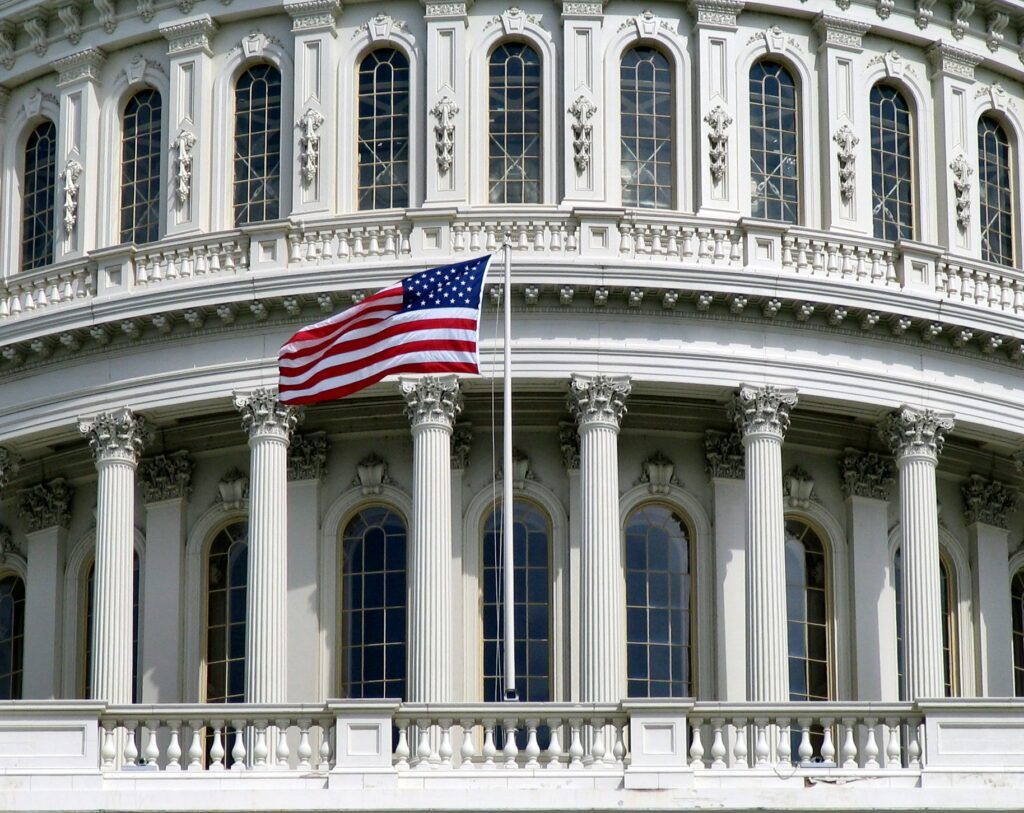Why a newly passed House “terrorism financing” bill could threaten nonprofits and free speech
By Sara Goudarzi | November 21, 2024
 The US House of Representatives passed H.R. 9495 today in a 219-184 vote. Image: Bobt54, CC BY 3.0
The US House of Representatives passed H.R. 9495 today in a 219-184 vote. Image: Bobt54, CC BY 3.0
The US House of Representatives has passed a bill—called H.R. 9495—that would give the Treasury secretary, who is appointed by the president, unchecked power to declare nonprofit groups “terrorist supporting organizations.” Under the “Stop Terror Financing and Tax Penalties on American Hostages Act,” the Treasury secretary could take away the tax-exempt status of designated nonprofits, greatly curtailing or ending their ability to operate.
Introduced last year as a way to curb activism in response to the war in Gaza, the bill passed the House in April but didn’t get through the Senate and was brought back to the House for a vote this month. The bill failed for procedural reasons in an initial vote last week but passed today in a 219-184 vote. Should the bill pass the Senate, it would give the Executive Branch power to indiscriminately silence dissent at any nonprofit on a variety of issues. (The Bulletin of the Atomic Scientists is an independent, nonprofit 501(c)(3) organization.)
I spoke to Kia Hamadanchy, senior federal policy counsel at The American Civil Liberties Union (ACLU), about the origins, implications, and future of the act.
The resulting interview has been lightly edited for clarity and length.
Sara Goudarzi: Could you discuss what the passage of this legislation means and also tell us a bit about the bill itself for anyone who might not be familiar with it?
Kia Hamadanchy: I’ll start with the bill: This gives the Treasury secretary pretty unilateral authority to label an organization a terrorist-supporting organization basically at [his] discretion without really much in the way of due process. The consequences of that is that the organization will have its tax exempt status stripped, and for a lot of organizations, that’s going to mean their donors don’t want to donate money to them because they’re afraid of being labeled supporters of terrorism themselves. Banks are not going to want to interact with them. They’re going to start paying corporate income taxes. There are legal fees associated with trying to fight this off in court. There are all sorts of state law implications, because a lot of state nonprofit law refers back to federal tax status. And there’s also just the stigma of being called a terrorist-supporting organization that for a lot of nonprofits, even if they might ultimately win in court, might cause a death spiral. It is a lot of authority to put in the [hands of the] Secretary of Treasury.
The ACLU would have opposed this bill, no matter who the president would be, but obviously, Donald Trump said a lot of things on the campaign trail about wanting to go after his perceived enemies and silencing critics that especially heightened concerns in terms of what the passage means.
I think it’s really important that last week (in an initial tally) 145 Democrats voted “no.” This week 184 voted “no.”
So, there were 34 Democrats who, because of all the outreach and pressure they received, switched their vote. And it’s really hard to switch 34 votes in a week on anything, and there are five more Democrats who didn’t vote last week, who voted this week and voted “no.” That’s a testament to just how much people were really engaged on this, and how much people reached out and really changed the numbers on this. I know that it still passed, because the Republicans have a majority, but I do think all that outreach made a really big difference and is going to be really helpful in terms of pushing back on this in the Senate. The good thing is, there’s not much time left in the Senate calendar, and the Senate is very busy for the time they do have. But we’re going to do everything in our power to make sure that doesn’t become law before the end of the year, and it may come back next year. We’re prepared for that, but right now, our focus is spending the next month making sure that this doesn’t pass.
Goudarzi: Who would be affected by this bill? Theoretically the bill cites terrorist-supporting organizations. So, people who might not know the details of the bill might think, “Well, if you’re not a terrorist supporting organization, then you’re fine.” What are the criteria for being labeled as such?
Hamadanchy: I think that’s the thing. It could apply to a really broad range of US organizations, because there are no criteria. It just says the Treasury secretary shall designate. So, there’s no standard of proof. There’s no evidentiary standard. The Treasury secretary doesn’t have to give you all the evidence for making the determination. They don’t have to give you evidence that would be exculpatory, evidence that would prove that you’re innocent, and the appeals process is entirely up to the secretary of Treasury. I can understand people who think, okay, terrorist supporting organizations should not get tax-exempt status. But that’s already the law. It is, in fact, a federal crime to provide material support to terrorists, and if you do that, you are going to prison and the tax-exempt status is the least of your worries.
But it’s also the case that if an organization was found to be providing material support, then they would not have tax-exempt status. That’s the law currently. What this [bill] does is completely remove all due process that does exist and make it much easier for the executive branch to really silence their critics and go after groups that they don’t like.
Goudarzi: Last week, the bill didn’t go through because the House needed a two thirds majority. But this time they were able to pass it with a simple majority. Can you explain why they were able to pass it with a simple majority?
Hamadanchy: Procedurally, there are two ways that this House can vote on something. Last week, they went through a fast-track procedure. It’s called suspension. So, when you try to pass a bill in suspension, it requires a two-thirds vote. And what happens with this suspension is you get to skip the Rules Committee, and you can go straight to the floor. But in return, and because of that, you’ve got to get two thirds—and more than a third of Democrats voted against it. So [Republicans] brought it back this week, and they did under regular order. They had to go to the Rules Committee, which did on Monday night, and were able to pass it to a majority today.
Goudarzi: The bill started as a way to curb organizations that were engaged in Palestinian activism. Can you talk a little bit about the history and origins of the bill?
Hamadanchy: When it first came into being, it was very clearly targeted at organizations who were involved in the protests regarding the situation in Gaza. The House Republicans have also sent a lot of letters to the Internal Revenue Service about these organizations, asking the IRS to strip their tax-exempt status under current authority. That was what kind of got it started with the bill, but the text of the bill is far broader than that. It could apply to basically any nonprofit that you can think of, in terms of this sort of broad authority.
Goudarzi: Can you name some of the categories of nonprofits that could be affected? Are we talking about, say, universities?
Hamadanchy: Absolutely. Universities is a good one. There are also a lot of nonprofit newsrooms, as another example. Basically anyone, anyone who’s a nonprofit within the tax code, which isn’t just 501(c)(3)s. And, like I said, when this bill came up, it was very clearly targeted at groups espousing a certain view, but that doesn’t mean they wouldn’t apply far broader than that. The other thing: This is also about chilling speech, the idea that because you know this authority exists, you’re not going to say things because you’re afraid the government is going to come after you because you don’t want to have your nonprofit status stripped. Imagine a world where a lot of the Republican House sponsors conflated a lot of these student groups with Hamas, without really much in the way of evidence. So, imagine a world where they came to the university and said “by allowing these people to protest, you’re supporting terrorism, and if you don’t stop, we’re going to strip you of your nonprofit status.”
Goudarzi: So, the bill will indirectly affect the First Amendment.
Hamadanchy: Yes, it’s definitely a fear that it’s going to chill speech and advocacy.
Goudarzi: Do you expect the bill to pass in the Senate?
Hamadanchy: We’re going to do everything we can to make sure it doesn’t.
Goudarzi: But do you expect it to?
Hamadanchy: I feel good about trying to block it this year, and then next year we’ll have to start all over again.
Goudarzi: Because you expect it’ll make the rounds again next year with the new Senate.
Hamadanchy: I think there’s good chance.
Goudarzi: As a nonprofit organization, what are you planning to do (in addition to fighting the bill) in terms of protecting yourself, and what can other nonprofits do to protect themselves?
Hamadanchy: I don’t know if we’ve thought so much about that aspect of things. We’re going to do everything we can to make sure it doesn’t become law. But I don’t know if we’ve thought in terms of that side of things.
Goudarzi: What else is there that you think is important that people know about this bill and if there’s anything that is not being discussed that should be brought to light about it?
Hamadanchy: I think the thing that’s important to flag is [the bill] has been attached to this hostage bill. There’s a bill having to do with if you’re held hostage abroad, the IRS can’t charge you tax penalties. So, the sponsors have attached these two bills together in an effort to make it harder for people to vote no. And the hostage bill has already passed the Senate unanimously. I don’t know of a single member of Congress who opposes it. And if these two issues were separated, it could go to Joe Biden’s desk today for signature…
This bill would make it so if you’re held hostage by a foreign government abroad, you don’t have to pay tax penalties because you didn’t file your taxes while you’re abroad. It’s an idea that I think everyone thinks is a good one, right? But somehow it’s attached to this [terror-supporting organization bill]. These two separate bills existed, and the Republicans took them and put them together because they wanted to make it harder for Democrats to vote “no.”
Together, we make the world safer.
The Bulletin elevates expert voices above the noise. But as an independent nonprofit organization, our operations depend on the support of readers like you. Help us continue to deliver quality journalism that holds leaders accountable. Your support of our work at any level is important. In return, we promise our coverage will be understandable, influential, vigilant, solution-oriented, and fair-minded. Together we can make a difference.
Keywords: H.R. 9495, House of Representatives, Senate, free speech, nonprofits
Topics: Disruptive Technologies, Interviews
















I don’t know, I think you missed the upside of the Bill. From a national security perspective, H.R. 9495 aims to bolster the United States’ ability to swiftly and effectively counter organizations that may pose a threat. By empowering the Treasury secretary to make timely designations of terrorist-supporting groups, the bill could enhance the government’s capability to prevent the misuse of nonprofit status as a shield for activities that support terrorism. In an era where threats are rapidly evolving, providing the executive branch with such authority could serve as a proactive measure to maintain national security, ensuring any organizations potentially… Read more »
The upside doesn’t outweigh it’s potential for harm. Terrorism is already a crime. If they want to go after specific non profits who are doing this, they should be able to do so and do more than just remove their non profit status. This bill allows the Secretary to bring accusations without disclosing the evidence behind them and would place the burden of proof on the organization to disprove the allegations. The potential for overreach, subjective application, and abuse of this authority is understandably a concern. And the consequences for the non profits who are targeted and those they support… Read more »